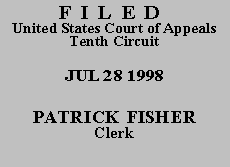

| UNITED STATES OF AMERICA,
Plaintiff-Appellee, v. MICHAEL RAYMOND STONE, Defendant-Appellant. |
|
In July 1995, defendant was sentenced by the Wyoming federal court to seventy months' imprisonment for manufacturing and distributing methamphetamine, and conspiring to possess with intent to distribute methamphetamine. He registered no objection to the calculation of his criminal history contained in the presentence report. He did not file a direct appeal. Nine months after he was sentenced, he filed a motion to correct errors in his presentence report. The district court denied that motion and this court affirmed, noting that relief must be sought pursuant to 28 U.S.C. § 2255. See United States v. Stone, No. 96-8039, 1996 WL 606311 (10th Cir. Oct. 23, 1996). Defendant then filed a motion pursuant to § 2255 to correct his presentence report and resentence him. The district court denied the motion. He now appeals the denial, proceeding pro se. We deny issuance of a certificate of appealability and dismiss the appeal.
Defendant's failure to object to the presentence report at the sentencing hearing will preclude him from raising the issue in a § 2255 motion, absent a showing of cause and prejudice. See United States v. Frady, 456 U.S. 152, 167-68 (1982). Constitutionally ineffective assistance of counsel can satisfy the cause and prejudice requirement. See United States v. Cook, 45 F.3d 388, 392 (10th Cir. 1995).
Defendant alleges his attorney rendered constitutionally ineffective assistance by failing to object to the presentence report, which included a conviction entered against him on a counseled guilty plea in Yuba County, California. Three points were added to defendant's criminal history score based on the Yuba County case. He claims that the Yuba County charges were ultimately dismissed and, therefore, could not be used to calculate his sentence in the Wyoming case. Defendant cannot dispute that the Yuba County charges were dismissed on November 16, 1995, four months after he was sentenced in the Wyoming case.
Defendant relies on a document entitled "Disposition of Arrest and Court Action" pertaining to the Yuba County charges to establish that he did not enter a guilty plea to those charges, contrary to the findings in the presentence report. He has also produced the November 1995 request and order for dismissal of the Yuba County charges. Defendant has not produced the complete Yuba County court file, however, and he has not denied that he entered a guilty plea to those charges. Rather, he argues only that the documents he submitted fail to prove he entered a counseled guilty plea.
To establish that counsel provided ineffective assistance, a defendant must demonstrate both that his attorney's representation was deficient and that the attorney's substandard performance prejudiced him. See Strickland v. Washington, 466 U.S. 668, 687 (1984). Defendant has failed to meet this burden. The two selected documents pertaining to the Yuba County charges are insufficient to establish that those charges were dismissed prior to entry of a guilty plea. Defendant has not established any error in the presentence report to which his attorney should have objected. Moreover, he does not contend that he told his counsel about this alleged error. Accordingly, he cannot fault his counsel for failing to challenge the presentence report. Cf. United States v. King, 936 F.2d 477, 480 (10th Cir. 1991) ("An attorney's failure to investigate cannot be charged as a claim of 'ineffective assistance of counsel' when the essential and foundational information required to trigger such an investigation is withheld from the defendant's attorney by the defendant himself.") (quotation omitted). Defendant also cannot fault his attorney for failing to foresee that the Yuba County charges would be dismissed after the Wyoming case was concluded. Defendant has failed to establish that his attorney's performance was constitutionally deficient.
To the extent defendant argues he may reopen his sentence on the ground that his Yuba County conviction was subsequently set aside, see United States v. Cox, 83 F.3d 336, 339 (10th Cir. 1996), we conclude that the grounds upon which the Yuba County charges were dismissed do not warrant reopening his federal sentence, see United States v. Hines, 133 F.3d 1360, 1363 (10th Cir. 1998) (court must examine grounds upon which defendant's sentence was set aside). Here, the district court found that the Yuba County case was dismissed because defendant was sentenced to prison in this case. Accordingly, the Yuba County charges were not dismissed "for reasons related to constitutional invalidity, innocence, or errors of law," id. at 1366, and it was appropriate to include the Yuba County charges in the calculation of his federal sentence.
Defendant's request for a certificate of appealability is denied. The appeal is DISMISSED.
Entered for the Court
Circuit Judge
*. This order and judgment is not binding precedent, except under the doctrines of law of the case, res judicata, and collateral estoppel. The court generally disfavors the citation of orders and judgments; nevertheless, an order and judgment may be cited under the terms and conditions of 10th Cir. R. 36.3.